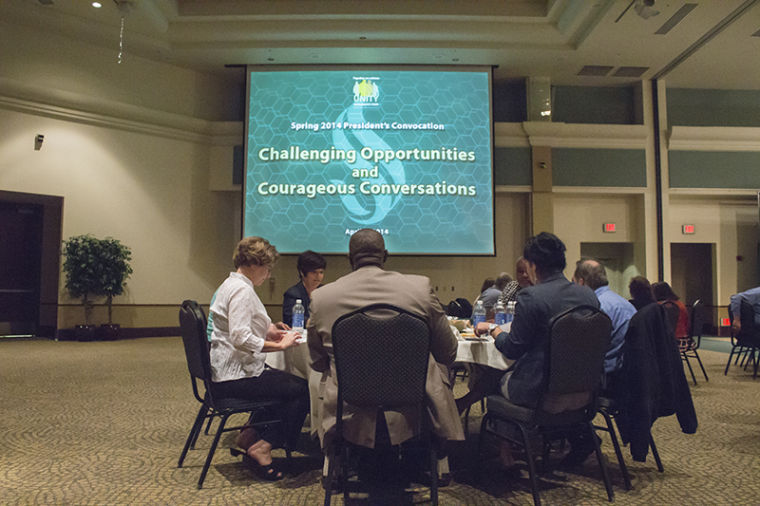Students, faculty discuss difficult situations at annual Spring Convocation
Faculty were invited to sit in and facilitate the table discussion at the Spring Convocation on Monday in the University Union.
April 8, 2014
As a Filipino-American, Associated Students Inc. President Nielsen Gabriel said he has faced typical Asian stereotypes, including being a math whiz and science genius.
But as a sophomore, Gabriel questioned the validity of racial stereotypes after encountering a group of people who he met for the first time. After learning of Gabriel’s ethnicity, one member told him “you speak English very well.”
“At that moment, I wasn’t sure how to respond,” Gabriel said. “I wasn’t sure if it was a compliment or a backhanded compliment or if it was an insult.”
Looking back, Gabriel said he felt offended and strongly believes making assumptions based on perceptions of race is wrong. He shared his thoughts and experiences with his peers Monday at Sacramento State’s annual Spring Convocation.
With the theme “Challenging Opportunities and Courageous Conversations,” the convocation seeked to unite members of the campus community by discussing different challenges and sharing collective experiences, including the role of mentors, difficulty getting classes and racial discrimination.
Sponsored by the President’s Committee to Build Campus Unity, the diversity and inclusion theme was also influenced by specific national and campus events, including the Trayvon Martin shooting and a mock student lynching that took place outside of Brighton Hall last December.
“We thought it was timely in that people could relate to all of those other things happening at the same time and be able to talk about it,” said Committee Chair Kimo Ah Yun said. “Some people see something that happens and become paralyzed. We really wanted to capture that moment and have a discussion about it.”
The two-hour event provided students, faculty and staff lunch while encouraging stereotype debates and other difficult topics and conversations. Three videos were shown as part of a short film competition, and included personal stories of the first-year experience and campus diversity.
Following the roundtable discussion, President Alexander Gonzalez spoke about strengthening campus unity through an open spirit of communication and honesty.
“We’re moving forward together,” Gonzalez said. “Not individually. Not in groups. But we’re moving forward together as a campus community. It helps us confront the difficulties we encounter as members of the university, and there are always difficulties.”
Four panelists including: counselor education professor Rose Borunda, history professor Jessie Gaston, alumni Ron Owens and senior communication studies major Sean Johnson, shared experiences of difficult situations following Gonzalez’s speech.
Johnson, who served in the military for approximately nine years and remains dedicated in resolving lesbian, gay, bisexual and transgender issues in the armed forces, said he experienced difficulty in donating blood at last year’s Causeway Classic blood drive.
While he was excited about the opportunity, Johnson filled out the questionnaire and was turned down for being gay.
“I was immediately disqualified,” Johnson said. “When I asked why, I was told it was because I had engaged in risky behavior.”
Frustrated, Johnson said he decided to use the opportunity to walk away and find a positive way to handle the situation by educating himself on various efforts to support gay blood donation rights.
“It’s just an outdated policy that needs to be looked at,” Johnson said.
Gabriel said if an issue remains quiet it will become accepted, which is why he will speak up if he disagrees. He said he believes in accepting people for what they are and for what makes them unique, and not judging them based on the color of their skin
“Gaining an understanding of where people are coming from, the things that make us unique and aspects that makes us all diverse as a community at Sac State are all very crucial things we need to be identifying and discussing,” Gabriel said.





























































































































